Services And Procedures
Minimally Invasive Knee Surgery
- Custom Patient Matched Knee Replacement
- Verilast Knee Technology
- Partial Knee Replacement
- Lifestyle Modification: losing weight, avoiding aggravating activities, modifying exercise to low impact activities only
- Exercises: specifically prescribed to improve strength and flexibility without exacerbating your pain
- Anti-inflammatory Medications: designed to knee joint anatomy decrease swelling in the joint and provide temporary pain relief
- Corticosteroid Injection: powerful anti-inflammatory agent injected directly into the joint
- Joint Fluid Therapy: a series of injections directly into your knee, designed to improve lubrication in the joint (find out more at www.supartz.com)
- Glucosamine/Chondroitin: dietary supplement that may relieve arthritic pain
- Bracing: used to provide external stability to the knee joint
- Arthroscopic Surgery: minimally invasive procedure to remove debris or repair torn cartilage
- Total Knee Replacement Surgery: surgical procedure that replaces all three compartments of the knee.

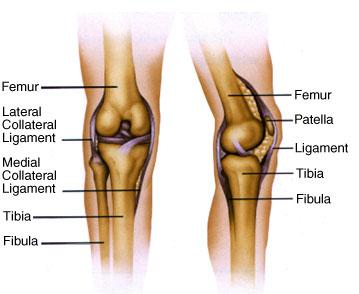
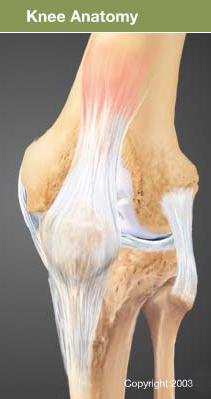
Minimally Invasive Hip Replacement
Total Hip Replacement Surgery
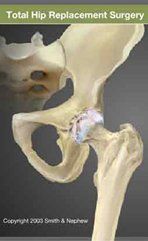
If you are considering hip surgery the following total hip replacement information might help you understand the procedure and implants better. Your hips work hard during your daily routine, and arthritis of the hip or a hip injury can make it hard for you to perform normal tasks. If your injury or arthritis is severe, you may begin experience pain when you’re sitting down or trying to sleep.
Sometimes a total hip replacement is the only option for reducing pain and restoring a normal activity level. If you and your doctor decide a total hip replacement is right for you, the following information will give you an understanding about what to expect.
A total hip replacement involves cutting away the damaged bone of the hip joint and replacing it with a prosthesis. This "new joint" prevents the bones from rubbing together and provides a smooth hip joint.
Implant Components
In the total hip replacement procedure, each prosthesis is made up of two major parts. The femoral component is a metal shaft with a ball on the end and replaces the top of the femur. The acetabular component replaces the socket side of the joint and is made of a metal cup and plastic liner.
Non-Surgical Alternatives to Hip Surgery
Before deciding on hip surgery, your physician may try several non-surgical, conservative measures to relieve the pain and inflammation in your hip.
Lifestyle Modification
The first alternative to hip replacement involves such lifestyle modification measures as weight loss, avoiding activities involving long periods of standing or walking, and the use of a cane to decrease the stress on the painful hip.
Exercise and Physical Therapy
Exercise and physical therapy may be prescribed to improve the strength and flexibility of your hip and other lower extremity muscles. Your exercise program may include riding a stationary bike, lightweight training and flexibility exercises. An aquatic therapy program is especially effective for the treatment of arthritis since it allows mild resistance while removing weight-bearing stresses. For an appropriate exercise program, contact an experienced physical therapist.
Anti-inflammatory Medications
Arthritis pain is primarily caused by inflammation in the hip joint. Reducing the inflammation of the tissue in the hip can provide temporary relief from pain and may delay hip replacement surgery.
Non-Steroidal Anti-Inflammatory Drugs (NSAIDs) may be prescribed to decrease the inflammation associated with arthritis. A new classification of NSAIDs called Cox-2 inhibitors are often very effective in decreasing pain and have fewer side effects.
In a small number of cases, the doctor may prescribe corticosteroids, such as prednisone or cortisone, if NSAIDs are not effective. However, due to the higher rate of side effects associated with corticosteriods, a physician must closely monitor their use.
Glucosamine/Chondroitin
Two dietary supplements, Glucosamine and Chondroitin (commonly available in a combined tablet), may decrease the symptoms of hip arthritis. Glucosamine and Chondroitin sulfate are both naturally occurring molecules, and issues associated with both remain under active research. However, it appears that may people taking these nutrition supplements on a regular basis note a decrease in their arthritis symptoms.
There exist a number of non-surgical alternatives to total hip replacement surgery. Such measures as lifestyle modification, exercise and physical therapy, and medication should be implemented before deciding on surgery. If all of these measures have been exhausted and your orthopedist recommends surgical intervention, total hip replacement surgery can be very successful in decreasing pain and greatly improving function.
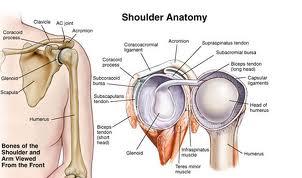
Shoulder Injuries or Problems
Reclaim your active lifestyle. Men and women of all ages can be affected by shoulder problems, whether it be a sports injury, accident or arthritis. We have all the same technology available to get your shoulder feeling better as we do with knees and hips.
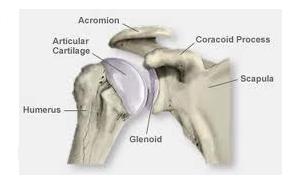
Contact Information
The Hawthorne Clinic
Ormond Beach
106 N. Old Kings Road, Suite E
Ormond Beach, FL 32174
Business Hours:
Monday-Friday, 7:30 a.m. - 4:30 p.m.
Phone:
386-671-0115
Fax:
386-671-0844
Port Orange
1690 Dunlawton Ave., Suite 110
Port Orange, FL 32127
Phone:
386-788-4949
Fax:
386-671-0844
Business Hours:
Thursday Mornings ONLY
7:30 a.m.- 10:30 a.m.
MOST INSURANCES ACCEPTED




